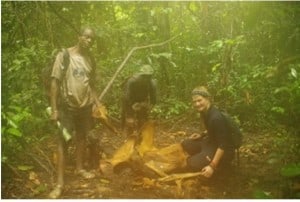
Barely four months since an elephant was found dead in the Mak-Betchou forest, Lebialem Division, SW Cameroon, another carcass of forest elephant has been found in the same forest 12km away from where the other one was found with tusks removed. The news about the dead elephant was brought by one of ERuDeF’s biomonitor, Njingu James.
Njingu James stumbled on the carcass of the elephant on June 210, 2014 with the ivory and tusk removed beside a small stream when he was conducting his regular bio-monitoring. He explains that from every indication, the elephant carcass was 10 weeks old. Njingu equally explained that part of the elephant meat was also smoked and carried away as local driers were found at that spot. After speaking to some hunters, Njingu gathered that the elephant poachers were a group of 3 hunters living in a neigbouring village- the Esso Attah. He gathered that after the elephant was killed and tusk/ivories removed, villagers were invited to carry the meat to the village.
Contrary to popular belief that only the ivory and the tusk of elephants were important for the elephant poachers, ERuDeF staff who investigated the killing of the elephants discovered that the bones were being used for varied purposes. The staff could not get enough reasons what the people need the bones for but most of the bones had been carried away by the time they got to the scene of the event. It is equally not clear why the traditional rulers will keep these poachers in their communities but there seem to be a mutual benefit plan put in place as the ERuDeF staff gathered.
Forest elephants are totally protected species and the Cameroon law prohibits killing except for self defense. In an effort to guarantee the safety of these animals, ERuDeF early this year launched the creation process for the proposed Mak-Betchou Sanctuary and early June, 2014, the NGO held a session with officials of the Ministry of Forestry and Wildlife to draw a Technical note for this sanctuary. It is hoped that once this sanctuary becomes totally protected by the Cameroon government, animals will no longer be killed randomly.
By Asoh Bedwin



